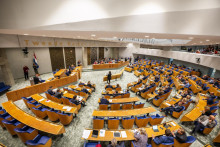Some parties felt that the outgoing education minister, Robbert Dijkgraaf, took far too long to send his internationalisation bill to the House of Representatives, but he finally did so just before leaving office. The bill would introduce new rules on language policies and the recruitment of foreign students.
But it’s by no means a done deal. The first round of a written consultation shows that the House still has many points of criticism. Addressing these will be up to Dijkgraaf’s successor, Eppo Bruins.
PVV
The new governing parties seem fairly pleased with the bill. The PVV reads it 'with some approval', the VVD 'broadly' supports the proposed measures and BBB is happy that foreign students will soon also have to take classes in Dutch.
In fact, the PVV would like to impose sanctions on higher education institutions 'that refuse to follow the spirit and instead abuse the letter of the law', the written consultation shows. The PVV even sees this as the 'most important issue'.
But the bill is all about striking the right balance, so what then is the ‘spirit of the law’? Is curbing the number of foreigner students the only thing that matters? Or is the primary focus on ensuring mutual consultation between institutions and taking the local context into account? This will need to be made clear before there can be any talk of sanctions.
NSC
The NSC’s position on this issue is striking. Now, just before the rubber hits the road, the party seems somewhat alarmed by the bill’s potential consequences. For one thing, fewer international students means less funding. 'Will institutions be disproportionately affected by this?' is one of the questions being raised by Pieter Omtzigt’s party. 'And if they are, how does the government intend to remedy this? Or will it allow exceptions?'
In the run-up to the general election, the NSC took a tough stance on foreign students and migrant workers, making this a somewhat unexpected about-face – suddenly, they are expressing concerns that international students and teachers might feel 'that they are no longer welcome in the Netherlands'. Another question the party asked in the written consultation: 'How can the government help put these sentiments into a broader context, particularly given the significant economic importance of a certain level of internationalisation and a certain number of international students going forward?'
Host of consequences
Among GroenLinks-PvdA MPs, the NSC’s comments will have raised more than a few eyebrows. The left-wing opposition party isn’t mincing words, warning that the new policy will have a host of consequences. 'Institutions will feel the pressure of the planned budget cuts, which could lead to a large wave of layoffs', the party believes.
It also lists other concerns. According to GroenLinks-PvdA, the new cabinet’s policy will lead to 'an impoverishment of science, less room for research, negative consequences for high-quality employment (especially in the technology sector), negative consequences for the business community, damage to the Netherlands’ competitive position, more pressure on researchers to apply for funding, less money for social safety at higher education institutions, less technological, social and medical innovation, negative geopolitical consequences with regard to the Netherlands’ strategic autonomy, negative consequences for the digital sovereignty, less money for knowledge security, a weaker competitive position for non-urban regions, negative consequences for SMEs in non-urban regions, and less knowledge about social issues.'
Own minister
Meanwhile, D66 is in a bit of a bind: the party doesn’t want to attack a bill drafted by its own minister, Robbert Dijkgraaf, but it is critical of the new cabinet. So its MPs wrote that they 'appreciate the government’s efforts to preserve the benefits of internationalisation while reducing the pressure on the Dutch education system'.
But they also want to know why the new cabinet thinks it can save €293 million by reducing the intake of international students. What happens if it turns out that this simply isn’t feasible under the new bill? Other parties are also raising questions about this.
Reputational damage
There are many more questions from other parties as well, for example about the damage to the Netherlands’ international reputation if foreign enrolments are capped (Volt), but also about the bureaucratic burden that comes with English-language programmes having to justify their language of instruction (SGP).
While the bill isn’t specifically designed to address the current housing shortage – it’s about higher education, after all – this problem does factor into the discussion. The ChristenUnie would therefore like to know more about the relationship between these two issues.
Some parties are also asking why universities of applied sciences will be subject to the same rules as research universities, even though they don’t enrol nearly as many international students. So why burden them with extra supervision and rules when there’s hardly a problem? The NSC also wonders how the government will take these differences into account.
Enrolment cap
The proposed enrolment caps play an important role here as well: the bill will allow programmes to set admission quotas for their non-Dutch tracks. This will preserve access for domestic students through the Dutch-language tracks while curbing the influx of foreign students – that’s the idea, at least.
But this means that more programmes will have an enrolment cap. 'According to the government, how should this scarcity of available places be dealt with?', the NSC asks. 'What are the options in terms of the deliberate or random selection of students, and what are the government’s preferences, also given the known effects of selection at the gate on equality of opportunity and performance pressure?'
This question will also puzzle opposition parties, as the outline agreement signed by the NSC includes the following statement: 'Continuation requirements [binding study advice] will not be relaxed and the options for selective admission will remain unchanged.' There’s your answer.
Soon enough?
All these questions will have to be answered by new education minister Eppo Bruins, who has already stated that he wants to waste no time in tackling internationalisation. So the answers may come sooner rather than later.
But will they come soon enough? D66 asked a question about the timeline: the government wants the law to come into force on 1 January 2025 – is this still feasible 'now that this bill will not be brought to the House floor until September 2024 at the earliest'?







